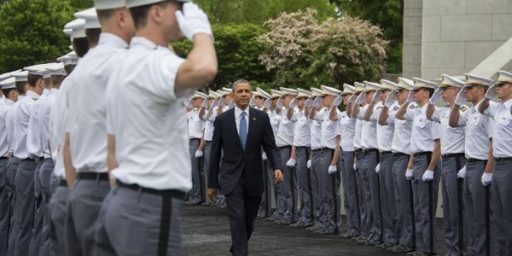FOREIGN POLICY IDEOLOGY
Daniel Drezner notes that most Realists opposed the war in Iraq, to which Matthew Yglesias responds
In a neat ideal-type world, you would have some realists arguing for some kind of obviously immoral policy (say, we should be working behind the scenes to provoke a nuclear war between India and Pakistan because that would enhance America’s relative share of world power) thought to be in the national interest, while your idealists (or neocons or whatever) would be arguing for something moral, but clearly contrary to the national interest, like an $87 billion grant for economic development in Chad.
In practice, however, people identified with non-realist policies tend to argue not that realist neglect of human rights, etc. is simply immoral, but that it’s also shortsighted and, fundamentally, that their analysis of the national interest is wrong. Invading Iraq and transforming it into a model Arab society isn’t just supposed to be some nice favor we do for the Iraqis, it’s also supposed to be the best way to make the US safe in the long-term. Realists, similarly, argue that their opponents are being unrealistic in the ordinary-language sense and that their schemes will fail. Doing something moral and idealistic isn’t actually moral unless it works, so the realists don’t actually concede anything on this front.
An interesting point.
While I agree with Dan’s implied premise that the so-called neo-conservatives (who argue we have a moral obligation to export democracy) aren’t Realists (who, by definition, think foreign policy is amoral), there were surely a lot of Realists who supported the war. This, of course, depends on one’s rationale. If one believed that Saddam was dangerous to US vital interests and that using force to topple his regime made us safer, then clearly that is the ultimate Realist rationale for war. If one was motivated primarily by a desire to end the suffering of the Iraqi people, that was a Liberal or Idealist motivation. Indeed, there were Realist and Idealist reasons for and against this war.






I think you’re right that many Realist-minded wonks supported the war, but Drezner was talking about big name Realist academics, who seemed uniformly against war with Iraq. In fact, it’s hard to think of someone wedded to a particular IR paradigm who publicly supported the war. IR Liberals were aghast that the US would use force without UN sanction, while IR Realists were aghast that the US would explicitly cite regime change as a reason to go to war. And don’t get me started on the IR Marxists . . .
In fairness to Greg Djerejian, who Drezner was replying to, many non-academics use the term “realist” interchangeably with “hawks concerned with the national interest,” which in turn refers to “realist” wonks like Rice, Scowcroft, Kissinger, Powell, etc. And as you note, at least some of them supported the war.
Then again, to buy Drezner’s argument you pretty much have to assume that individuals can be neatly pigeonholed into precise academic categories that we teach all of our students in International Relations 101. That is probably true for a number of pointy-headed academics whose careers are built around building a “big idea” around themselves. However, very few actual policymakers actually fall into a specific camp; the nature of the policymaking game requires one to make policy on a case-by-case basis. It is a good thing that most realist, neo-realist, post-neo-realists, post-raisin bran academics don’t make policy.
—